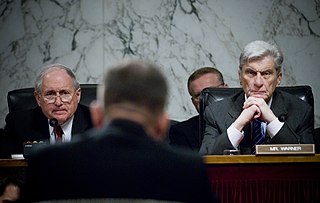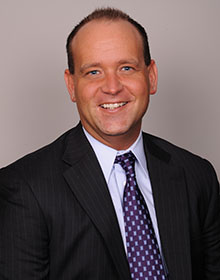
Article One of the United States Constitution establishes the legislative branch of the federal government, the United States Congress. Under Article One, Congress is a bicameral legislature consisting of the House of Representatives and the Senate. Article One grants Congress various enumerated powers and the ability to pass laws "necessary and proper" to carry out those powers. Article One also establishes the procedures for passing a bill and places various limits on the powers of Congress and the states from abusing their powers.

The United States Congress is the legislature of the federal government of the United States. It is bicameral, composed of a lower body, the House of Representatives, and an upper body, the Senate. It meets in the U.S. Capitol in Washington, D.C. Senators and representatives are chosen through direct election, though vacancies in the Senate may be filled by a governor's appointment. Congress has 535 voting members: 100 senators and 435 representatives. The U.S. vice president has a vote in the Senate only when senators are evenly divided. The House of Representatives has six non-voting members.

The federal government of the United States is the national government of the United States, a federal republic located primarily in North America, composed of 50 states, five major self-governing territories, several island possessions, and the federal district and national capital of Washington, D.C., where most of the federal government is based.

A congressional committee is a legislative sub-organization in the United States Congress that handles a specific duty. Committee membership enables members to develop specialized knowledge of the matters under their jurisdiction. As "little legislatures", the committees monitor ongoing governmental operations, identify issues suitable for legislative review, gather and evaluate information, and recommend courses of action to their parent body. Woodrow Wilson once wrote, "it is not far from the truth to say that Congress in session is Congress on public exhibition, whilst Congress in its committee rooms is Congress at work." It is not expected that a member of Congress be an expert on all matters and subject areas that come before Congress. Congressional committees provide valuable informational services to Congress by investigating and reporting about specialized subjects.

The Congressional Record is the official record of the proceedings and debates of the United States Congress, published by the United States Government Publishing Office and issued when Congress is in session. The Congressional Record Index is updated daily online and published monthly. At the end of a session of Congress, the daily editions are compiled in bound volumes constituting the permanent edition. Chapter 9 of Title 44 of the United States Code authorizes publication of the Congressional Record.

Nita Sue Lowey is an American politician who formerly served as a U.S. Representative from New York from 1989 until 2021. She is a member of the Democratic Party. Lowey also served as co-Dean of the New York Congressional Delegation, along with former U.S. Representative Eliot Engel. Lowey's district was numbered as the 20th from 1989 to 1993, as the 18th from 1993 to 2013, and as the 17th beginning in 2013. The district includes many of New York City's inner northern suburbs, such as White Plains, Purchase, Tarrytown, Mount Kisco, and Armonk. She was succeeded by fellow Democrat Mondaire Jones.

The United States House Committee on the Budget, commonly known as the House Budget Committee, is a standing committee of the United States House of Representatives. Its responsibilities include legislative oversight of the federal budget process, reviewing all bills and resolutions on the budget, and monitoring agencies and programs funded outside of the budgetary process. The committee briefly operated as a select committee in 1919 and 1921, during the 66th and 67th United States Congresses, before being made a standing committee in 1974.

The Bureau of Legislative Affairs, also known as the "H Bureau", is the office of the United States Department of State that coordinates legislative activity for the Department of State and advises the Secretary, the Deputy, as well as the under secretaries and assistant secretaries on legislative strategy. The bureau facilitates communication between State Department officials and the Members of Congress and their staffs. The bureau works closely with authorizing, appropriations, and oversight committees of the House and Senate, as well as with individual members that have an interest in State Department or foreign policy issues. The bureau manages department testimony before House and Senate hearings, organizes member and staff briefings, and facilitates Congressional travel to overseas posts for members and staff throughout the year. The bureau reviews proposed legislation and coordinates Statements of Administration Policy on legislation affecting the conduct of U.S. foreign policy. The bureau staff advises individual bureaus of the department on legislative and outreach strategies and coordinates those strategies with the secretary's priorities.

During the presidency of George W. Bush, several American politicians sought to either investigate Bush for possible impeachable offenses, or to bring actual impeachment charges on the floor of the United States House of Representatives Judiciary Committee. The most significant of these efforts occurred on June 10, 2008, when Congressman Dennis Kucinich, along with co-sponsor Robert Wexler, introduced 35 articles of impeachment against Bush to the U.S. House of Representatives. The House voted 251 to 166 to refer the impeachment resolution to the Judiciary Committee on June 11, where no further action was taken on it. Bush's presidency ended on January 20, 2009, with the completion of his second term in office, rendering impeachment efforts moot.
Congressional districts, also known as electoral districts in other nations, are divisions of a larger administrative region that represent the population of a region in the larger congressional body. Countries with congressional districts include the United States, the Philippines, and Japan.

The clerk of the United States House of Representatives is an officer of the United States House of Representatives, whose primary duty is to act as the chief record-keeper for the House.
Congressional oversight is oversight by the United States Congress over the executive branch, including the numerous U.S. federal agencies. Congressional oversight includes the review, monitoring, and supervision of federal agencies, programs, activities, and policy implementation. Congress exercises this power largely through its congressional committee system. Oversight also occurs in a wide variety of congressional activities and contexts. These include authorization, appropriations, investigative, and legislative hearings by standing committees; which is specialized investigations by select committees; and reviews and studies by congressional support agencies and staff.
Minnesota's 6th congressional district includes most or all of Benton, Carver, Sherburne, Stearns, Wright, and Anoka counties. Many of the Twin Cities' outer northern and western suburbs are included within the boundaries of this district, such as Blaine, Andover, Chaska, Ramsey, St. Michael-Albertville, Elk River, Chanhassen, Otsego, Lino Lakes, Buffalo, Ham Lake, Monticello, Waconia, Big Lake, East Bethel, and Victoria. The St. Cloud Area is the other major center of population for the district, including the cities of St. Cloud, Sartell, and Sauk Rapids.
A United States congressional hearing is the principal formal method by which United States congressional committees collect and analyze information in the early stages of legislative policymaking. Whether confirmation hearings, legislative, oversight, investigative, or a combination of these, all hearings share common elements of preparation and conduct. Hearings usually include oral testimony from witnesses and questioning of the witnesses by members of Congress. George B. Galloway termed congressional hearings a goldmine of information for all the public problems of the United States. A leading authority on U.S. government publications has referred to the published hearings as "the most important publications originating within Congress." The Senate Library in a similar vein noted "Hearings are among the most important publications originating in Congress."
Apart from general elections and by-elections, midterm election refers to a type of election where the people can elect their representatives and other subnational officeholders in the middle of the term of the executive. This is usually used to describe elections to a governmental body that are staggered so that the number of offices of that body would not be up for election at the same time. Only a fraction of a body seats are up for election while others are not until the terms of the next set of members are to expire. The legislators may have the same or longer fixed term of office as the executive, which facilitates an election midterm of the tenure of the higher office.

Procedures of the United States Congress are established ways of doing legislative business. Congress has two-year terms with one session each year. There are rules and procedures, often complex, which guide how it converts ideas for legislation into laws.
The U.S. Congress in relation to the president and Supreme Court has the role of chief legislative body of the United States. However, the Founding Fathers of the United States built a system in which three powerful branches of the government, using a series of checks and balances, could limit each other's power. As a result, it helps to understand how the United States Congress interacts with the presidency as well as the Supreme Court to understand how it operates as a group.
De Veau v. Braisted, 363 U.S. 144 (1960), is a 5-to-3 ruling by the Supreme Court of the United States that an interstate compact restricting convicted felons from holding union office is not preempted by the National Labor Relations Act or the Labor Management Reporting and Disclosure Act, does not violate the Due Process Clause of the 14th Amendment, and is not an ex post facto law or bill of attainder in violation of Article One, Section 10 of the Constitution.

The chaplain of the United States House of Representatives is the officer of the United States House of Representatives responsible for beginning each day's proceedings with a prayer. The House cites the first half of Article 1, Section 2, Clause 5 in the United States Constitution as giving it the authority to elect a chaplain, "The House of Representatives shall choose their speaker and other officers".










